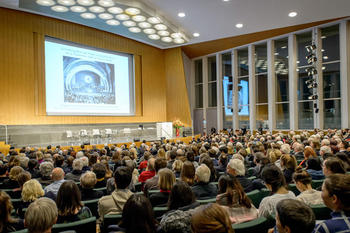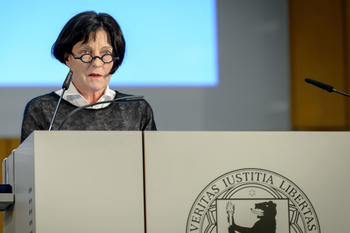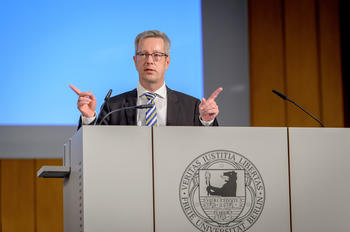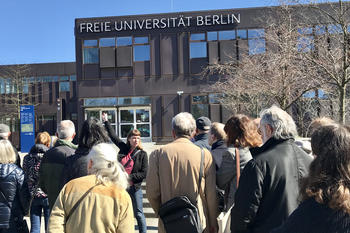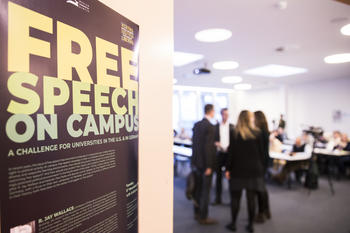70 Years of Freie Universität Berlin
Anniversary Events in 2018
Dec 14, 2018
More than 1,300 people attended the anniversary celebration. On the screen behind the stage: a photo of the official founding ceremony of Freie Universität in December 1948.
Image Credit: Regina Sablotny
The Nobel laureate in Literature, Herta Müller, gave a very moving presentation. Born in Romania, she described what it means to live where freedom is lacking.
Image Credit: Regina Sablotny
Günter M. Ziegler, president of Freie Universität, stressed that academic freedom must be defended time and time again.
Image Credit: Regina Sablotny
Campus tour on the history of Freie Universität
Image Credit: Freie Universität Berlin
In a lecture series on the occasion of the anniversary, academic freedom was addressed in an international context.
Image Credit: Falling Walls Foundation
Throughout the year many lectures, events, and publications were devoted to the founding of Freie Universität Berlin in 1948. Back then, many students who were influenced by the repressive atmosphere during World War II and the increasingly ideological orientation of the University of Berlin, which had been founded in 1810 and after the war found itself in the zone of the city occupied by the Soviet Union, were seeking academic freedom. The Latin terms Veritas, Justitia, Libertas, or truth, justice, and freedom, became the motto of the new university. What is their significance today?
Campus Walking Tours
Two different walking tours of the campus in Berlin-Dahlem were part of the anniversary program. One walk was devoted to the art of improvisation necessary in the early years in order to begin teaching on the outskirts of badly bombed Berlin. Books and furniture were donated by individuals and sometimes picked up and brought to Dahlem by the students themselves. At that time the new university only had a few empty institutes and villas. By 1952 the Ford Foundation donated funds to construct a new centrally located main building; today the Henry Ford Building, characterized by its clear and transparent architecture, is still one of the landmarks of the campus. A second walk was devoted to the German student movement in 1968, which started in Berlin.
Lecture Series
Both the founding students in 1948 and the protesting students in the 1960s advocated freedom of research and teaching. In a lecture series, academic freedom was addressed in an international context. For example, Joybrato Mukherjee, the president of Universität Gießen and the vice president of the Academic Exchange Service (DAAD), reflected in his presentation https://www.fu-berlin.de/campusleben/70-jahre/aktuell/180806-International-Week-Joybrato-Mukherjee/index.html on how international academic cooperation can bring about change at universities, even in countries that do not uphold individuals’ rights to freedom. The American philosopher R. Jay Wallace from UC Berkeley and the German historian Paul Nolte from Freie Universität discussed free speech at universities in the United States and Germany: “Free Speech on Campus: A Challenge for Universities in the U.S. and in Germany” https://www.fu-berlin.de/campusleben/campus/2018/181116-free-speech-on-campus/index.html .
Dies academicus and Anniversary Celebrations at the Institutes
Some of the institutes that were founded the first year also celebrated their 70th anniversary this year, for example, the Institute for Media and Communication Studies and the Institute for Theater Studies. Exhibitions and conferences pointed out changes in themes and perspectives. This year December 4, the day that Freie Universität Berlin was officially founded in 1948, was designated a dies academicus, officially an academic holiday on which all regular classes were canceled so that individual academic departments and institutes could hold special events related to the founding or history of the institutes. For example, at the Institute of Philosophy there was a discussion about the history of the institute in the 1960s, when the differences between various philosophical approaches were particularly great. The Department of Biology, Chemistry, and Pharmacy hosted successful alumni and offered tours of the institutes.
A Diverse University
Many individual alumni from around the world as well as current members of Freie Universität shared stories and impressions. They can be found at “Faces of Freie Universität,” where about 120 contributions can be viewed online, and more are still being added! https://www.fu-berlin.de/sites/70jahre/gesichter/index.html
Videos submitted in this year’s video competition “Campus International” illustrate the diversity of Freie Universität, both historically and today. The audience choice award went to a film about a project at the Institute for Latin American Studies entitled Narrative of Deracination. The jury selected the film Memories of a Living Structure for the first prize. Some of the videos are in English or there are English subtitles. https://www.fu-berlin.de/presse/informationen/videowettbewerb/index.html
Anniversary Celebration
The highlight of the anniversary celebrations was the official ceremony on the day of the 70th anniversary. The Nobel laureate in Literature, Herta Müller, who in 2005 as the first Heiner Müller Visiting Professor of German Literature taught for a semester at Freie Universität, gave a very moving presentation. The author, who grew up in Romania, described what it means to live where freedom is lacking: “Freedom is always concrete,” she says. It is either there, or it is not there. If it is not there, it is missing in everything. When she described her experiences living under dictatorship, it became very tangible to members of the audience, what propelled the 16 students in Berlin in 1948 to found their “own university,” a free university. Feeling oppressed by the increasing lack of freedom and the persecution of students and scholars at the University of Berlin, then called Universität Unter dem Linden, and which later became Humboldt-Universität, they chose to defend academic freedom. Two of them – Klaus Heinrich and Karol Kubicki, who later both became professors at Freie Universität Berlin and are now both over 90 years old – were present at the main celebration. The president of Freie Unversität, Professor Günter M. Ziegler, said, “Freedom cannot be taken for granted. It must be defended time and time again. For our university it remains a commitment and a mandate at the same time.”

